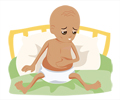
‘This study finds that the experience of violence and poverty during childhood is associated with both having emotional and behavioral problems termed as ‘internalizing disorder’ and ‘externalizing disorder’, during adolescence.’
Tweet it Now
The study was conducted in two different neighborhoods in the city of São Paulo, Brazil, one urban and one more rural. One-hundred and eighty 12-year-olds from public schools and their caregivers were interviewed to determine the influence of previous violent events and of socioeconomic status on the prevalence of psychiatric disorders. Using structured interviews, the research team led by Silvia Martins, MD, PhD, Mailman School associate professor of Epidemiology, evaluated psychiatric disorders including: internalizing disorders (depression, anxiety and post-traumatic stress disorder) and externalizing disorders (attention-deficit hyperactivity disorder, conduct disorder and oppositional-defiant disorder).
Nearly one-quarter (22 percent) of the youths had a psychiatric disorder. Depression and attention-deficit hyperactivity disorder were the most common diagnoses, at 9.5 percent, and 9 percent, respectively, followed by anxiety disorder at 6 percent.
A total of 14 percent of the sample had an internalizing disorder, nearly half of whom were males (45 percent). Another 15.5 percent had an externalizing disorder. Almost 60 percent of the adolescents with any diagnosis had experienced at least one violent event during their lifetime.
"If Brazil invests more to tackle socio-economic inequalities as well as to prevent exposure to urban violence in childhood and adolescence, the country will most likely be able to prevent the development of several cases of adolescent psychiatric disorders," said Martins.
Advertisement
Source-Eurekalert















